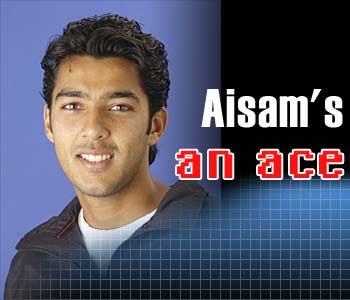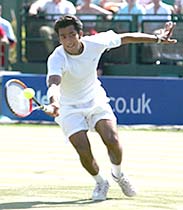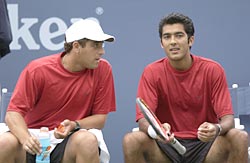 | « Back to article | Print this article |

Aisam Qureshi had lost the semi-final of the ITF tournament only two hours ago. But the voice that pattered over the phone from Bangalore had few worries in the world. The match was over and done with. There were newer horizons to seek.
Being Pakistan's number one tennis player comes with a responsibility. So does inherited talent and a cultivated personal dream.
"Right now I am completely focused on the next Davis Cup tie, against Chinese Taipei. I want to take Pakistan to the World Group play-offs. Also, there are the Islamic Games coming up in Saudi Arabia. I hope to win a medal for my country. I am also looking forward to qualify for the Wimbledon singles this year and break into the top 150."
He says all that in one breath.
There is a hint of Leander Paes in Qureshi; in his passion and ambition. Both have honed their tennis in foreign lands. Both revere grass and Wimbledon. Both have sports genes running through their bloodstream. Both have given a new meaning to the Davis Cup in their country. Both play with unapologetic pride when representing the country.
Only the star and the crescent replace the tricolour, as they slash opponents big and small.
"The Davis Cup is a great experience, especially when you are playing in front of your home crowds. It always inspires you to give more than hundred per cent."
But, while at 31 Paes can start chiseling his commemoration stone, Qureshi, at 25, has only half-paved his path to glory. Paes had the inspiring tales of Ramanathan and Ramesh Krishnan and Vijay Amritraj to lean on. Qureshi is the first to pick up the baton for Pakistan.
In his debut season, in 1998, he took Pakistan from Group II to Group I for the first time. Pakistan has only been relegated once, in 2000, since then.
 In the last tie, against Thailand last month, Qureshi turned tables on his fancied opponents, beating Asia's number one player Paradorn Srichaphan 7-5, 2-6, 6-4, 6-4 in the reverse singles to give Pakistan an unassailable 3-1 lead.
In the last tie, against Thailand last month, Qureshi turned tables on his fancied opponents, beating Asia's number one player Paradorn Srichaphan 7-5, 2-6, 6-4, 6-4 in the reverse singles to give Pakistan an unassailable 3-1 lead.
"That was the biggest match of my life," he exclaims.
The lingering scent of that battle remains.
"My family and friends had come down to watch the game. It was a very crucial game and I am happy I brought Pakistan through it."
His answers are tinged with a British accent that sometimes break into typical Lahori. Rather than a contrast, he sounds like a blend of cultures.
In a country clutched in conservatism he took up a European game. Unlike most Asians on the circuit, he is built big but has a chip-and-charge game typical to the clan.
Qureshi follows cricket and Arsenal with the same passion; travels and trains in Europe for most part of the year but returns to his roots every three months to make sure Pakistan does well in the Davis Cup; cares enough for Pakistan to make a mark in the Islamic Games but doesn't understand the fuss about teaming up with an Indian or an Israeli.
"I have played doubles with Rohan Bopanna and Harsh Mankad. I know almost all the Indian players, since we move in the same circuit and we are good friends. I have also been coming to India for almost seven years now and have never felt threatened. It is always fun coming to cities like Mumbai and Delhi. Sports can only help bridge the relationship between the two countries."
 The Pakistan Tennis Federation had threatened to take action against him during the 2001 Wimbledon championships for partnering Israel's Amir Hadad, a Jew, in the doubles tournament. (Left: Amir Hadad with Aisam Qureshi.)Qureshi had then given the same reasoning -- of helping people overcome those differences -- and marched into the third round of the doubles Grand Slam, a mark no Pakistani had even contemplated.
The Pakistan Tennis Federation had threatened to take action against him during the 2001 Wimbledon championships for partnering Israel's Amir Hadad, a Jew, in the doubles tournament. (Left: Amir Hadad with Aisam Qureshi.)Qureshi had then given the same reasoning -- of helping people overcome those differences -- and marched into the third round of the doubles Grand Slam, a mark no Pakistani had even contemplated.
Qureshi had the spirit of challenging bigots and limited ambitions. He had seen his mother Nosheen topple convention and become the leading lady of Pakistan tennis for a decade.
"It was obviously my mother who introduced me to the game. She used to take me to tennis courts but she wasn't my first coach. As soon as my family found out that I was interested in the game they appointed a formal coach (Shawn Cole)."
He became the junior world number seven and by the age of 16 had beaten most of the promising juniors -- Andy Roddick, Taylor Dent and Oliver Rochus. Though his mother was a shining example, he was more comfortable aspiring for a medical or engineering degree like so many of his relatives and cousins.
"I was doing well for myself at tennis but I always thought I would go to an American university and become a doctor or engineer."
But his parents stepped in and encouraged him to have a shot at professional tennis.
At 19, he turned pro. He was fortunate to be born in a family that could absorb his expenses.
"Without my parents' support I couldn't have done anything. Even today it is my dad who looks after my tennis. He doesn't want to approach sponsors and says we don't need to as long as we can afford it. The PTF is very lazy and doesn't care for its players. They should be going around looking for sponsors for players."
Though tennis continued, education was not pushed off the priority list. Qureshi obtained a degree in economics from Lahore University. As he steadily climbed the ATP rankings, going as high as 181 in 2004, Pakistan had to recognise its champion and did so by awarding him the title -- Pride of Performance. On August 14, 2004, Qureshi became the youngest recipient of the award.
"I am proud of what I have achieved. I know the game has started to generate some interest in Pakistan. But there is a lot more to do."
Again the immediate focus shifted to the Davis Cup.
"I badly want to see Pakistan in the World Group. And it really is a fantasy of sorts to have India and Pakistan clash in a Davis Cup tie."
And have Leander Paes cross swords with him.
Photographs: Getty Images
Headline image: Imran Shaikh